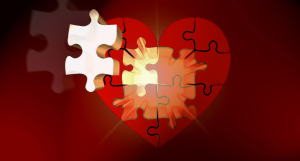Human beings are naturally very sociable. We enjoy the company of others and crave positive interactions and meaningful friendships. Our romantic relationships are a very significant part of our lives; they can bring us great happiness, but they can also bring us the most hurt. Strong connections with our loved ones should provide us with love, support and guidance, however sometimes this is not the case. Previously rewarding relationships can break down and become difficult to sustain, if the communication, respect and consideration between the individuals has been worn down. Sometimes our trust is betrayed by our partners, and this can leave us feeling lonely, disappointed and even angry. When this happens we can withdraw into ourselves, as a way to save ourselves from more hurt and disappointment.
 Very rarely do we give up on our relationships at the first sign of trouble; many of us may think that it’s our fault that the relationship has broken down, so we try to compensate by trying harder, being more considerate and generally being more agreeable. We’re working really hard at the relationship but not really talking to our partner about how we really feel. This can leave us with the belief that we are giving more than we are getting out of the relationship, which can add to our anger. When there is no balance in a relationship, it can be easy to think that you are making all the effort.
Very rarely do we give up on our relationships at the first sign of trouble; many of us may think that it’s our fault that the relationship has broken down, so we try to compensate by trying harder, being more considerate and generally being more agreeable. We’re working really hard at the relationship but not really talking to our partner about how we really feel. This can leave us with the belief that we are giving more than we are getting out of the relationship, which can add to our anger. When there is no balance in a relationship, it can be easy to think that you are making all the effort.
Addressing any issues in a relationship can be difficult, as we find ourselves not only thinking about our own fears and feelings, but also those of our partner’s. We may fear that our feelings won’t be heard, or acknowledged; or that you might end up getting drawn into the blame game. On the other hand we may find ourselves in a relationship that may not be fulfilling our expectations anymore; your interests might have changed, your life goals may not be the same, this can also impact on your happiness and life satisfaction.
Relationship issues vary considerably, depending on the nature of the relationship and the circumstances that have led to problems. Below are the most common types of relationship issues that are addressed in counselling:
- Affairs and betrayal
- Separation and divorce
- Pre-nuptial concerns
- Family issues
- Cross-cultural relationships
Relationship counselling provides a safe place where both individuals can talk about their feelings in a non-judgemental environment with a professional who is experienced in nurturing them both. In relationship counselling, therapists will work with clients to resolve factors and explore why things have gone wrong and how problems can be overcome.
All relationships are unique, however there are a few key qualities that signify strong, healthy connections. These include:
- Trust – Relationships are built on trust, which is essential for good communication and forming strong bonds. If we trust our partner not to hurt us, then we are more willing to open up about how we are feeling.
- Respect – Strong supportive relationships depend on mutual respect, as it cultivates understanding of each other’s needs, values and feelings.
- Good communication – Being open with your partner eliminates misunderstandings and allows you to connect more deeply.
Research has shown that people with satisfying relationships are likely to have fewer health problems and live longer, as we feel more secure and loved. In contrast, those who do not have many social connections tend to show signs of depression and cognitive decline, as loneliness and anxieties are amplified. Relationship counselling is focused primarily on making sure relationship issues are dealt with in a way that supports the health and well-being of those involved.


Leave a Reply